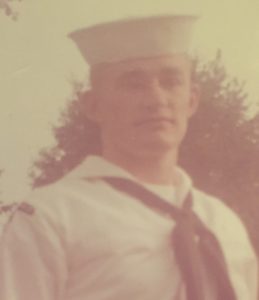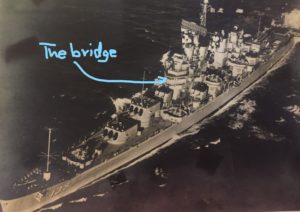Twice when I went home on leave, to Charlotte from Long Beach, California, my ship’s home port, I got hops on military planes, once to Memphis, Tennessee, and once to Dayton, Ohio.
On my first free ride, on a fat, slow transport plane headed to Memphis, I was handed a parachute and told to put it on. Someone showed me what to pull if we had to jump.

There were 12 or 15 passengers, a mixture of uniformed enlisted men from all the services. We sat on canvas bottom benches attached to each side of the plane. I sat next to a paratrooper so I could try to do what he did if worse came to worse.
An engine was chained down in the middle of the plane, between the two rows of servicemen, which is why we had all been given parachutes. If the engine broke loose, the pilot told us, he would drop the ramp in the back so we could jump.
[You know what I was thinking, don’t you: Why not just wrap another chain around that engine.]
The noise from the plane’s engines was deafening. We couldn’t talk. Or sleep.
Somewhere along the way I noticed a door on the side of the plane, toward the rear, was open, banging back and forth. I couldn’t hear it, too much engine noise. But I saw it. I got up and headed back there to close the door. Just as I started to reach for it someone grabbed me and pulled me back. It was the paratrooper. He closed the door. And then he shouted in my ear, “You could have been sucked out.”
* * *
When we arrived in Memphis it was dark and I had already been awake for more than two days — before going on leave I had had to work night and day, literally, to finish my work. I was desperate for sleep but I was also desperate to get home, so I kept going.
I decided to hitchhike to Atlanta and then on to Charlotte to avoid going over the Appalachian mountains where I figured there wouldn’t be much traffic. After midnight a truck driver I had been riding with stopped at a truck stop and handed me off to another driver who said he’d take me the rest of the way to Atlanta, on one condition: I couldn’t go to sleep. If I went to sleep, he said, he’d put me out.
Oh, my!
At that point I needed toothpicks to keep my eyelids from closing. Lucky for me I didn’t have to carry on a conversation — the driver talked non-stop. So I just wedged myself between the seat and the door, willed myself to keep my eyes open, mumble “Uh-huh” occasionally, and went to Atlanta.
* * *
When I was in the Navy, and on into my early 20’s, I thought you had to hitch-hike some to be a man. So, even though I had money in my pocket and could have bought a bus ticket, that’s what I did.
Getting rides was easy in the early 1960’s, especially for men in uniform. And it was interesting, too. You got to talk to a lot of different people and you learned things.
When I hitchhiked from Dayton to Charlotte an exterminator gave me a ride through part of West Virginia. I asked him about his business and how he went about killing bugs. I also asked him how he decided how much to charge.
He said he would go into the customer’s house, look around, see what kind of furniture they had, whether it was nice or not, and then charge accordingly.
Coming Friday: The Debacle
